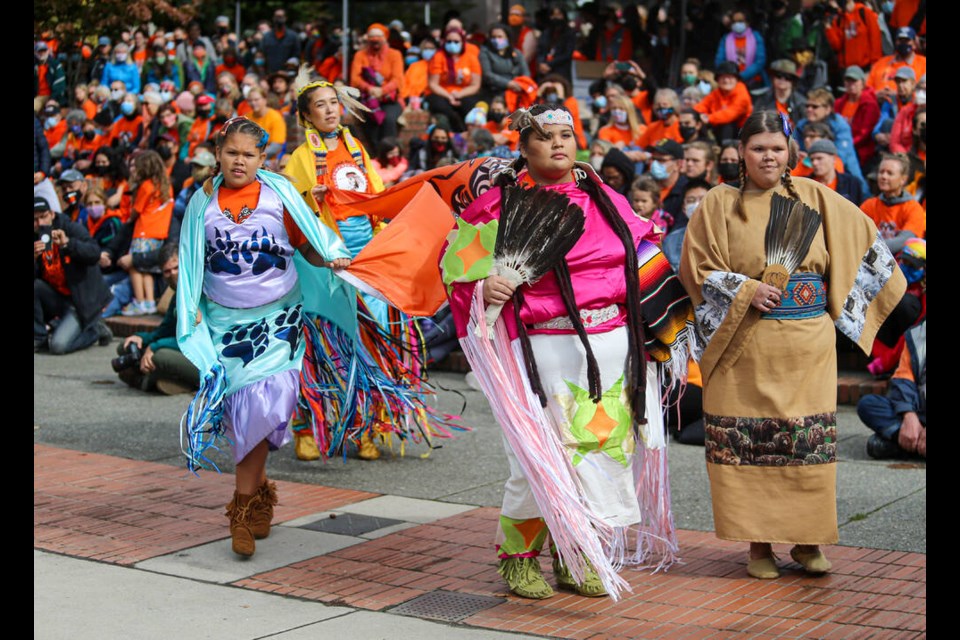As a child forced to attend residential school, Eddy Charlie saw children receive beatings for speaking their language and calling their brothers and sisters by their Indigenous names. He watched kids go hungry, because they were fed only once or twice a day.
Some of his former classmates can’t stand cereal, because they were given bowls of it that were more like water, Charlie told a crowd packed into Centennial Square Thursday to mark the first National Day for Truth and Reconciliation. “And sometimes it was so old, it had bugs or maggots crawling around in it, but we were forced to eat it anyhow,” he said.
That wasn’t the worst of his experience, Charlie said. Many survivors don’t like to talk about the sexual abuse they suffered because they feel ashamed, but Charlie said he wants people to hear what happened to him when he was only four years old.
“I’d wake up every night and I’d look up at the ceiling and all I’d see is that priest smiling down on me,” he said. “That’s my reality. I have to live with that for the rest of my life. And there are many other residential school survivors who have to live through the same thing. I want people to hear this story. I want people to know what happened to all these children.”
Residential schools taught children hate, anger and distrust, and they brought that home with them when they were allowed to leave the schools, Charlie said.
“What residential school didn’t destroy, we did,” he said. Survivors kept silent for so long, and they became a part of the genocide, Charlie said, because they taught their families to hate and to be angry, “just like us.”
“I’m ashamed to acknowledge that some of the worst violence against our women, our children, comes from men that went to residential schools. But we need to talk about this. We need to acknowledge it, change this,” he said.
Charlie said he hopes the creation of National Day for Truth and Reconciliation as a federal statutory holiday allows survivors to open up and share their stories. “I hope that when we do that, we’ll be able to accept ourselves for who we were meant to be, and not let residential school dictate where we walk or what we do,” he said.
Hundreds gathered in Centennial Square Thursday afternoon to hear Charlie and other residential school survivors speak about the harms they suffered at the government-funded institutions.
It was the first National Day for Truth and Reconciliation, created in the wake of the discovery of probable unmarked graves near a former residential school in Kamloops.
An estimated 150,000 children were taken from their parents and forced to attend residential schools across Canada from the 1870s to the 1990s. Children were physically, sexually and emotionally abused, starved and neglected. The Truth and Reconciliation Commission identified 3,200 deaths of children at the institutions, but the actual number is likely higher.
Many of the deaths weren’t recorded by name, and for about half, a cause of death wasn’t recorded, according to the commission.
The government failed to establish adequate standards to guarantee the health and safety of children, which was “largely a function of the government’s determination to keep residential school costs to a minimum,” a report by the Truth and Reconciliation Commission says.
Charlie, co-organizer of the Centennial Square event, thanked people for wearing orange and coming to show their support. “When you put these orange shirts on, you honour people like me,” he said.
The crowd was sombre as speakers shared their stories.
When MLA Mitzi Dean, minister of children and family development, took the microphone to speak about the child welfare system, a woman in the crowd interrupted, calling out government for the over-representation of Indigenous children in care.
“Taking children is the new form of residential schools,” the woman said to applause.
In Canada, more than half of all children in care are Indigenous, even though Indigenous people make up less than eight percent of the child population, federal statistics show.
Events to mark the day took place across Greater Victoria and the Island. Hundreds of people on bikes took over downtown streets to cycle to Beacon Hill Park and listen to Diane Sam from the Songhees Nation speak.
Sam shared a story of an interaction she had with an American tourist while working at a Songhees cultural centre. The man knew nothing about residential schools, and she explained that his four-year-old grandchild was the same age as many children taken from their families.
When she finished, Sam said, “He asked: ‘Why didn’t the government do anything about it? Why didn’t the police do anything about it?’ … And I said, ‘Did you know the police, the government and the churches were all part of it?’ ”



